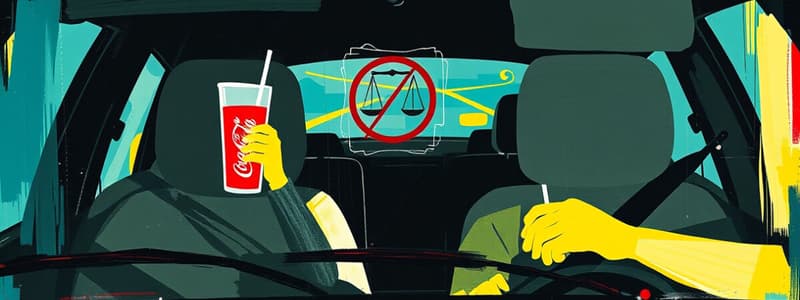Podcast
Questions and Answers
What does the Road Traffic Act 1988 specifically address concerning driving?
What does the Road Traffic Act 1988 specifically address concerning driving?
- Driving without a valid license
- Driving under the influence of drink or drugs (correct)
- Performing unauthorized vehicle modifications
- Driving in hazardous weather conditions
Which concept is emphasized as affecting driving ability in the context of the lesson?
Which concept is emphasized as affecting driving ability in the context of the lesson?
- Physical fitness
- Emotional stability
- Duration of the journey
- Consumption of drink or drugs (correct)
What is one of the learning outcomes of this lesson regarding Section 5 of the Road Traffic Act 1988?
What is one of the learning outcomes of this lesson regarding Section 5 of the Road Traffic Act 1988?
- Outline the penalties for speeding
- Describe the offences contained in Section 5 (correct)
- Discuss vehicle safety inspections
- Explain the history of traffic laws
What aspect of legislation does this lesson aim to clarify for learners?
What aspect of legislation does this lesson aim to clarify for learners?
Which of the following statements is true regarding the effects of drink or drugs on driving?
Which of the following statements is true regarding the effects of drink or drugs on driving?
In the lesson, what is indicated as a critical learning component regarding suspects of specific offences?
In the lesson, what is indicated as a critical learning component regarding suspects of specific offences?
What should learners be able to apply after completing the lesson?
What should learners be able to apply after completing the lesson?
Which element is NOT included in the learning outcomes for this lesson?
Which element is NOT included in the learning outcomes for this lesson?
What does Section 5 of the Road Traffic Act 1988 prohibit?
What does Section 5 of the Road Traffic Act 1988 prohibit?
What constitutes a motorist being 'in charge' of a vehicle according to Section 5?
What constitutes a motorist being 'in charge' of a vehicle according to Section 5?
Which of the following is NOT a component of the prescribed limit measurement?
Which of the following is NOT a component of the prescribed limit measurement?
What should happen at a police station after a person is arrested for excessive alcohol consumption while driving?
What should happen at a police station after a person is arrested for excessive alcohol consumption while driving?
Which scenario demonstrates the action of attempting to drive according to Section 5?
Which scenario demonstrates the action of attempting to drive according to Section 5?
What is the primary focus of roadside procedures related to alcohol consumption?
What is the primary focus of roadside procedures related to alcohol consumption?
If a driver is found with alcohol levels above the legal limit, which of the following consequences might they face?
If a driver is found with alcohol levels above the legal limit, which of the following consequences might they face?
Which of the following best describes the term 'public place' in the context of the Road Traffic Act?
Which of the following best describes the term 'public place' in the context of the Road Traffic Act?
What is the primary reason a police officer can require a breath specimen under Section 6 of the Road Traffic Act 1988?
What is the primary reason a police officer can require a breath specimen under Section 6 of the Road Traffic Act 1988?
Which section of the Road Traffic Act 1988 requires a suspect to provide samples upon arrest?
Which section of the Road Traffic Act 1988 requires a suspect to provide samples upon arrest?
What type of samples can be required from a suspect under Section 7 of the Road Traffic Act 1988?
What type of samples can be required from a suspect under Section 7 of the Road Traffic Act 1988?
What happens if a suspect's alcohol level is found to be above the prescribed limit?
What happens if a suspect's alcohol level is found to be above the prescribed limit?
What is the most common method for obtaining a breath sample for analysis?
What is the most common method for obtaining a breath sample for analysis?
Prior to requiring a specimen from a suspect, which action should be considered regarding the vehicle's driver identity?
Prior to requiring a specimen from a suspect, which action should be considered regarding the vehicle's driver identity?
Under which condition may a driver be arrested under Section 6 of the Road Traffic Act 1988?
Under which condition may a driver be arrested under Section 6 of the Road Traffic Act 1988?
What might happen if a person arrested under Section 6 fails a breath test?
What might happen if a person arrested under Section 6 fails a breath test?
Under which section is the power of arrest for drink driving established?
Under which section is the power of arrest for drink driving established?
Under what circumstance can a blood or urine sample be obtained at the police station?
Under what circumstance can a blood or urine sample be obtained at the police station?
What must a Constable have to arrest a person under drink driving laws?
What must a Constable have to arrest a person under drink driving laws?
What should the Constable say to ensure that the person understands they are under arrest?
What should the Constable say to ensure that the person understands they are under arrest?
What is required for a blood sample to be collected under certain circumstances?
What is required for a blood sample to be collected under certain circumstances?
What can happen if a person refuses to supply a breath specimen without reasonable excuse?
What can happen if a person refuses to supply a breath specimen without reasonable excuse?
What constitutes an offence related to providing specimens?
What constitutes an offence related to providing specimens?
Is there a provision in Section 6 for police to enter premises to obtain a breath specimen?
Is there a provision in Section 6 for police to enter premises to obtain a breath specimen?
What is one key difference in procedure for suspected offences when someone is admitted to a hospital?
What is one key difference in procedure for suspected offences when someone is admitted to a hospital?
Which of the following is NOT a reason for obtaining a specimen at the police station?
Which of the following is NOT a reason for obtaining a specimen at the police station?
When may a Constable use force to enter premises?
When may a Constable use force to enter premises?
For a person to be arrested under drink driving laws, which scenario is necessary?
For a person to be arrested under drink driving laws, which scenario is necessary?
What must be present when obtaining a blood sample at the police station?
What must be present when obtaining a blood sample at the police station?
What constitutes a reasonable excuse for refusing to provide a breath specimen?
What constitutes a reasonable excuse for refusing to provide a breath specimen?
What should every police office with a breath analysis machine have available?
What should every police office with a breath analysis machine have available?
What is NOT a condition for failing to provide a specimen?
What is NOT a condition for failing to provide a specimen?
Flashcards are hidden until you start studying
Study Notes
Drink Driving Overview
- The Road Traffic Act 1988 addresses driving under the influence of alcohol or drugs.
- Offences include driving, attempting to drive, or being in charge of a vehicle with alcohol levels exceeding legal limits.
Section 5 Offences
- It is illegal to operate a motor vehicle after consuming alcohol beyond prescribed breath, blood, or urine limits.
- "Driving" refers to having control over a vehicle's speed and direction.
Arrest Procedures
- Arrests for drink driving are governed by Section 6 of the Road Traffic Act 1988, not the Criminal Justice (Scotland) Act 2016.
- Arrests can occur if the individual fails a breath test or if reasonable suspicion exists that they have consumed alcohol.
- The phrase "I arrest you" must be stated to confirm the individual’s arrest.
Breath Specimen Requirements
- Police can require a breath specimen; refusal can lead to caution and charges unless no suspicion of alcohol exists.
- Police can forcibly enter premises to procure evidence if necessary and if a suspect is believed to be inside.
Section 7 Procedures
- Following an arrest under Section 6, individuals are taken to a police station to provide breath, blood, or urine samples.
- Samples help determine the exact alcohol content; exceeding limits can lead to prosecution under Section 5.
Specimen Collection
- Breath samples are typically collected using a breath analysis machine; two samples are standard procedure.
- Blood or urine samples are only collected if breath sampling is unavailable, in case of medical reasons, or if the breath analysis is unreliable.
Offence of Refusal
- Refusal to provide breath, blood, or urine specimens without reasonable excuse constitutes an offence under Section 7.
Hospital Admission Procedures
- Different protocols are followed when a suspect is taken to the hospital after a suspected Section 5 offence.
- Responsibility for the suspect shifts to the doctor in charge upon hospital admission.
Key Points
- Police must adhere to specific statutory procedures when dealing with suspected drink driving.
- Legal definitions and required actions are crucial for law enforcement and the prosecution of drink driving offences.
Studying That Suits You
Use AI to generate personalized quizzes and flashcards to suit your learning preferences.




